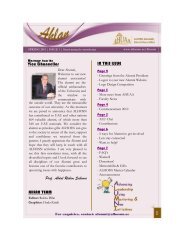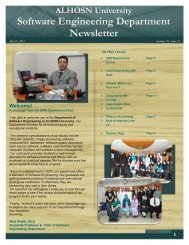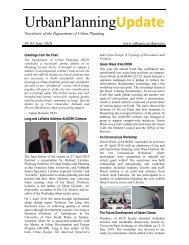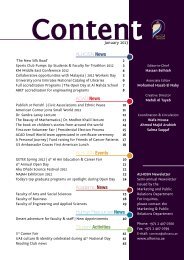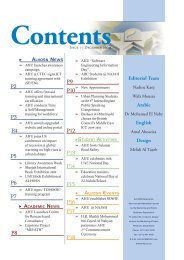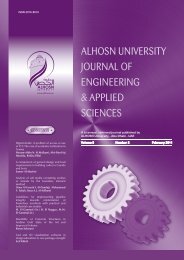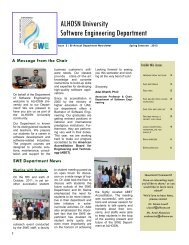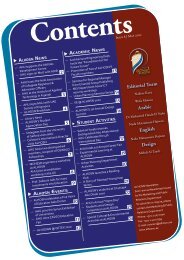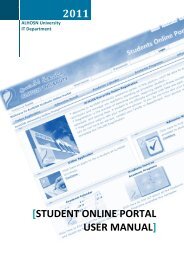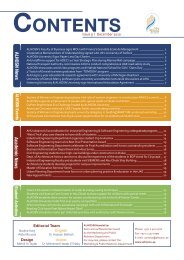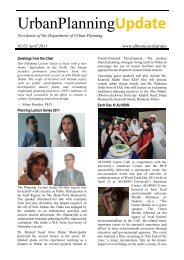ALHOSN University Catalogue Global Knowledge with Local Vision ...
ALHOSN University Catalogue Global Knowledge with Local Vision ...
ALHOSN University Catalogue Global Knowledge with Local Vision ...
You also want an ePaper? Increase the reach of your titles
YUMPU automatically turns print PDFs into web optimized ePapers that Google loves.
ENG 302 Introduction to Literature (3 = 3 + 0)<br />
This is the initial course in literature. It introduces literature and the nature of literary language including critical<br />
commentary on the social, literary, and cultural influences which have shaped it. By introducing student readers to<br />
its three major genres (poetry, fiction, and drama), the course analyzes the diverse elements of literature as a field<br />
of study and also urges the student to familiarize himself/herself <strong>with</strong> different aspects and forms of literature<br />
including Anglophone literature outside of England and the USA and children’s literature before taking more<br />
complex and more intellectually demanding upper-level literature courses.<br />
ENG 303 First and Second Language Acquisition (3 = 3 + 0)<br />
This course introduces key concepts in language learning and teaching. It covers topics such first language<br />
acquisition, age and acquisition, styles and strategies and personality factors influencing language learning.<br />
Emphasis is placed on interpreting these theories as they relate to learning English in the UAE environment.<br />
ENG 304 Advanced Writing (3 = 3 + 0)<br />
The third course in the writing sequence emphasizes the techniques and methods essential to a thoughtful,<br />
carefully written, and well-designed essay. The course is envisaged as comprising three focuses in terms of the<br />
principal structural stages of the unified essay: the beginning, the body, and the conclusion. The course outline<br />
adheres to that sequence.<br />
EDU 306 Teaching Methods of English for Young Learners (3 = 3 + 0)<br />
This course aims at introducing prospective teachers to recent models and strategies of teaching English for young<br />
children (1- 3) in the Elementary School. Among the topic covered are: language and child development, English<br />
teaching standards, and approaches to teaching language skills to lower elementary children such as TPR, and<br />
learning activities. Emphasis is placed on active learning of language skills as well as classroom practices that<br />
address the needs of diverse students. Microteaching is part of this course.<br />
EDU 307 Teaching Methods of English in the Elementary School (3 = 3 + 0)<br />
This course aims at introducing prospective teachers to recent models and strategies of teaching English as a<br />
foreign language (EFL) in upper Elementary School. Among the topics covered are: whole language methods<br />
of integrating language skills (reading, writing, speaking, listening, rhymes, and storytelling). Emphasis is placed<br />
on successful classroom practices that address the needs of diverse students. Microteaching is part of this course.<br />
ENG 401 Child Literature in the Classroom (3 = 3 + 0)<br />
This course aims at introducing prospective teachers to the different formats of children’s literature and their<br />
contribution to young learners’ acquisition of a foreign language. It covers traditional folktales, fables and legends<br />
as well as modern fantasy, poetry, contemporary fiction and multicultural literature. The course also deals <strong>with</strong><br />
literature groups such as book clubs and discussion groups and their impact on language learning.<br />
ENG 403 Survey of English/American Literature (3 = 3 + 0)<br />
This is a survey course of the main literature genres in British and American literature (poetry, fiction, and drama)<br />
from the beginnings to the late 20th century. A general treatment covers major authors and their work in a<br />
historical context <strong>with</strong> selections from such works. The course is geared towards the courses in literature offered<br />
by the department and acts as a background to authors and ages covered in those courses. Emphasis is placed on<br />
modern literary works, and students are required to reflect on their readings.<br />
ENG 404 Introduction to Linguistics (3 = 3 + 0)<br />
An introductory course in the field of modern linguistics. It covers the basic ideas concerning the scientific<br />
study of Language as a system of communication and a form of human behavior. It also introduces the student<br />
to linguistic analysis by solving problems from English. Finally, this course covers the interrelationship<br />
between linguistics and other disciplines such as psychology, sociology, and anthropology.<br />
ENG 405 English Phonetics (3 = 3 + 0)<br />
A study of the sound system of the English language treating the production and perception of sounds and<br />
clarifying the concepts of ‘contrast’ and ‘distribution’. Drills in pronunciation and transcription accompany this.<br />
ENG 406 English Syntax (3 = 3 + 0)<br />
An analysis of English syntax using modern approaches. This course presupposes earlier instruction in grammar,<br />
remedial or otherwise, <strong>with</strong>in the scope of the introductory language courses. A degree of overlap is expected and<br />
recommended. However, the nature of the approach is different. This course aims at a comprehensive treatment<br />
of the Sentence in English. The course does not lend itself to any particular approach as long as the totality of<br />
topic is maintained.<br />
163



